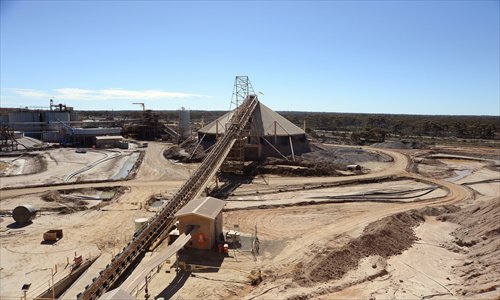HOME >> BUSINESS
BHP’s new pay plan to hold executives accountable in dual path to sustainability
Source:Global Times Published: 2019/9/24 20:38:40

Photo: CFP
The world's largest miner is making sustainability pay. BHP wants to make more of its chief executive's bonus dependent on reducing emissions and climate goals. The $122 billion group is also trimming overall incentives and will make boss Andrew Mackenzie hold shares for longer. For an industry struggling to regain investor trust, it's an important step.The so-called Big Australian's new policy caters to changing demands from investors, even if not all are going green at the same pace. It's also a way to tie poor decisions to compensation more closely.
Variable rewards under its old plan would have been unpalatably big - $13.1 million - if paid out in full. Thanks to missed targets, the plan has not done so since 2014. That kept Mackenzie's remuneration to a modest $3.5 million for the last financial year.
Now BHP says the cash-and-deferred-plan or bonus portion, of which half is still determined by traditional financial metrics, will include specific, transparent climate goals from July next year. Currently, emissions-related targets only amount to about 4 percent - in a fuzzy way. BHP has already said it wants to maintain 2022 operational emissions at or below 2017 levels.
The other sustainability leg is operational. The Council of Institutional Investors, in policies adopted this month, says extended vesting periods reduce attention to short-term distractions. Mining, a highly cyclical industry, is still recovering from costly diversions. Confidence remains weak, and shares are languishing near what Bernstein analysts say are their lowest valuation levels in a century.
As such, BHP's proposal will link executives to the consequences of their choices for longer. Shares will vest over two and five years. Retiring CEOs will hold shares worth five times their salary for two years.
The move positions BHP alongside Royal Dutch Shell, a fellow extractive player that has started to link pay to climate policies.
But both need to see their actions as a first step. As when Shell announced its policy last year, the miner is yet to give specifics about its climate targets.
Detail matters, especially when it comes to whether pay is linked to emissions produced directly or those created by customers and suppliers. Macquarie's top executives, meanwhile, have shares vesting over three to seven years. Even so, as an example to peers, it's worth applauding.
The author is Clara Ferreira-Marques, a Reuters Breakingviews columnist. The article was first published on Reuters Breakingviews. bizopinion@globaltimes.com.cn
Posted in: INSIDER'S EYE